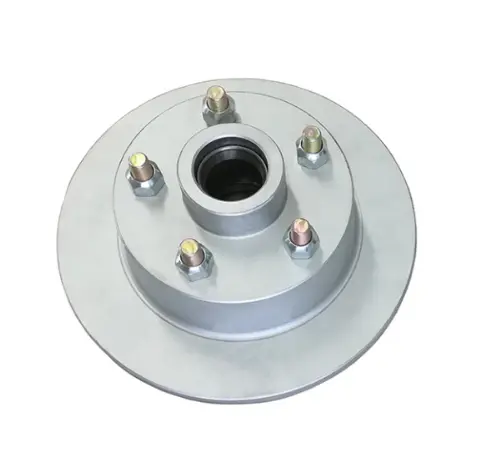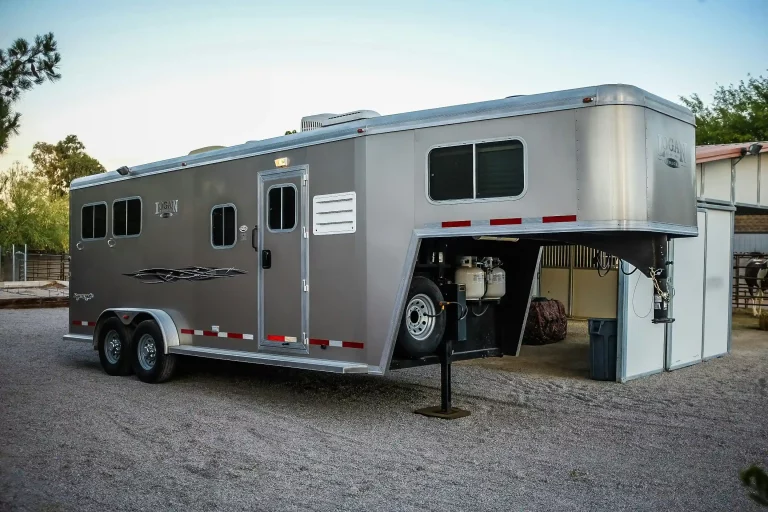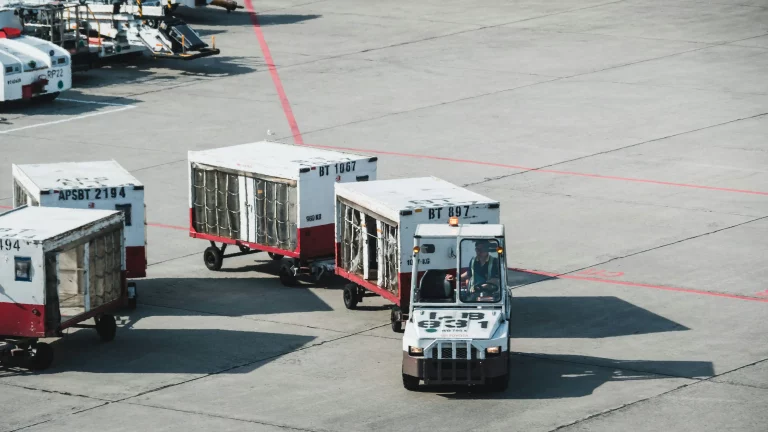It’s important to keep your trailer hubs greased to make sure they last long and work well for you in the way possible! If you don’t grease them enough, they could get worn out quickly and need expensive fixes or might even stop working altogether! Grease acts like a shield that blocks water and dirt from getting into the parts of your trailer hubs, which helps keep them safe from damage caused by harmful stuff getting inside them! Keeping your trailer hubs greased can also make towing smoother and give you better control over your vehicle while on the road.
The Consequences of Neglecting Regular Lubrication
Neglecting to lubricate the hubs on your trailer can result in repercussions. Lack of lubrication can lead to increased friction and heat, over time which may result in components failing. This not only puts the safety of your trailer and its contents at risk but could also lead to expensive repairs. To prevent breakdowns and roadside issues from occurring, it is important to make regular maintenance a top priority.
Benefits of Proper Greasing
A lubricated trailer’s hubs offer various advantages like preventing overheating and extending the bearings’ longevity while boosting performance overall. Regularly applying grease can lead to better braking function and smoother turns with noise disruptions. Moreover, ensuring your trailer hubs are properly greased can increase the resale value of your trailer as prospective buyers value maintained parts.
How Often Should You Grease Your Trailer Hubs?
Deciding how frequently you should grease the hubs of your trailer depends on factors such as how often you use it and the kind of cargo you carry as well as the weather conditions around you. It’s crucial not to neglect upkeep though the exact timing, for this task can differ.
Manufacturer Recommendations vs. Real-World Conditions
The guidance provided by the manufacturer forms the basis for maintaining your hub. Most manufacturers advise applying grease every 1k miles or annually as a requirement. Factors like carrying heavy loads or traversing rough terrain and regular exposure to water might call for more frequent greasing. It’s smart to keep an eye on your hubs and adjust your maintenance routine according to your specific situation.
Specific Scenarios Requiring More Frequent Greasing
Some situations call for more frequent lubrication of your trailer hubs. If you often transport loads or work in wet or muddy conditions, it’s a good idea to grease them more often. Moreover, if you use a boat trailer that frequently gets submerged in water, it’s important to check and apply grease to prevent rust and corrosion. Being attentive to your trailers’ requirements will help prolong the lifespan of their parts in the run.
Step-by-Step Guide to Greasing Your Trailer Hubs
Greasing your trailer hubs can be a straightforward process when equipped with the right tools and knowledge. Below is a comprehensive guide to ensure you’re performing this vital task effectively.
Tools and Materials You Will Need
You’ll need a grease gun with the right grease (like marine or lithium grease), a clean cloth for cleaning up messes, and maybe a jack or jack stand to lift the trailer if needed. Ensure your workspace is clean and organized for a smooth procedure.
Detailed Process for Greasing Hubs Efficiently
Preparation Phase
Begin by lifting your trailer to make it easier to reach the hubs underneath it securely. Take off the wheel to reveal the hub assembly. Once you have a clear view of the hub assembly, use a cloth to wipe away any old grease and dirt. This step is important to prevent any substances from mixing with the new grease.
Application Phase
Once the hub is clean, apply the grease using your grease gun. Insert the nozzle into the grease fitting and pump until you see fresh grease oozing from the bearings or seals, indicating proper lubrication. Be cautious not to over-grease, as this can cause pressure build-up and damage seals. After ensuring adequate lubrication, reassemble the wheel and check for smooth rotation. Regularly practicing this maintenance ritual will keep your trailer hubs in prime condition for all your towing adventures.
In summary and to wrap it up, it’s crucial to grease your trailer hubs correctly to boost their longevity and efficiency levels to the maximum extent possible! Knowing when to lubricate as per recommendations or when extra greasing is needed due to conditions and following a smooth process for applying grease can help maintain your trailer in top-notch condition for many years ahead.
For help and information about trailer components and accessories, you may wish to explore GO Trailer for a diverse selection of items, such as the Disc Hub 5stud 114.3mm which could enhance the dependability of your trailer.
Make sure to make the most out of the Customization features provided to personalize your trailer according to your requirements for better effectiveness.
Make sure to inspect and lubricate your trailer as part of your maintenance routine to ensure safe and trouble-free towing adventures.
Common Mistakes to Avoid When Greasing Trailer Hubs
Over-Greasing vs. Under-Greasing
When maintaining trailer hubs, grease is considered; applying much or too little can result in serious issues that many owners unknowingly face these days. Over-greasing happens when an excess amount of grease is inserted into the hub, causing pressure to rise and potentially leading to seal damage and loss of grease. Conversely, under greasing poses a risk of lubrication which can create harmful friction and heat that may harm the bearings gradually over time. Ensuring the hub stays in shape is crucial for its integrity maintenance. That’s why keeping tabs on its condition regularly is key to steering clear of any issues like these.
To reduce these risks effectively and maintain your trailer hubs in condition over time: 1. Make it a habit to inspect the hub regularly for any signs of greasing problems. 2. Look out for leaks and excess grease; catching these issues early is crucial. 3. Ensure you use a high-quality grease that matches well with your hub components. 4. Not all greases are suitable for trailer hubs; therefore, it is important to stick to one choice. 5. Consistency in your grease selection can enhance your maintenance routine and prolong the lifespan of your hubs significantly. By following these steps and staying proactive in your maintenance efforts, you can keep your trailer hubs functioning smoothly and avoid potential issues down the road.
Using Incompatible or Poor-Quality Grease
One challenge for those who own trailers is dealing with the issue of using grease that’s not suitable or of poor quality, which can result in problems such as sludge buildup in the hub due to the grease not having the essential properties to shield against moisture and heat or oxidation as needed, leading to potential wear on the bearings from contaminants entering it, ultimately affecting performance and potentially causing early hub failure.
Selecting the grease is crucial when it comes to trailer maintenance. It’s important to choose products designed specifically for trailer hubs as they typically include additives that improve performance in varying temperatures and heavy loads. Additionally, it’s advisable to change old grease to preserve its effectiveness and be proactive about upkeep. Make sure to use grease that meets or surpasses industry benchmarks to guarantee the performance of your hubs.
Enhancing Hub Longevity Through Customization and Quality Parts
Why Customization Matters for Optimal Performance?
Enhancing the performance and lifespan of your trailer hubs relies heavily on customization tailored to meet your hauling requirements and withstand the various demands placed on them by different loads and terrains.
Investing in materials or designs can better handle heavy loads and improve how the hub interacts with other trailer parts efficiently tailored for your hauling needs minimizing wear and tear on components. Personalization lets you consider the demands of your tasks while optimizing parts to prolong the trailer’s lifespan and functionality. This individualized method not only boosts performance but also offers reassurance that your trailer is outfitted with suitable systems for your unique operational conditions.
Investing in High-Quality Parts for Long-Term Benefits
Invest wisely in top-notch components to reap long-term rewards; although they may come at a premium initially, they typically offer improved dependability and efficiency, and lower maintenance needs, your trailer hub is an example – opting for sturdy materials can greatly combat wear and extend the hub’s longevity.
Furthermore, top-notch components frequently include warranties or customer assistance to guarantee that you receive expert advice in case any problems arise. Switching to parts also results in improved trailer performance while in transit; ultimately impacting your overall experience with hauling. Purchasing premium quality components pays off in ways, from providing peace of mind to boosting efficiency significantly.
Where to Find Reliable Parts and Expert Advice?
Trusted Sources for Trailer Parts and Accessories
When looking for reliable parts and accessories for your trailer hubs, turning to reputable suppliers is essential. Sources that specialize in trailer components often have a broad range of products, including certified brands known for their quality and reliability. Online stores, like GO Trailer, make it convenient to find a selection of trailer hubs and associated parts that cater to your requirements.
Moreover, experts in the field can provide advice regarding which components are most suitable for your particular needs. By seeking guidance from vendors or utilizing feedback and evaluations from customers you can make well-informed decisions that enhance the functionality of your trailer hubs. Keep in mind that the caliber of components impacts not only the efficiency but also the overall safety of your trailer while in use.
Professional Tips from Industry Experts
Getting advice from professionals in the field can enhance how you take care of your trailer maintenance tasks. The expertise gained through years of experience can offer advice and techniques that go beyond just routine greasing steps. For example, a common suggestion from experts is to keep a record of your trailer’s maintenance history. This log should include details about greasing schedules and any parts that have been replaced. Doing this can help spot trends and possible problems.
Forums and online discussions are places to get advice and help troubleshoot trailer-related issues too! Interacting with trailer owners lets you exchange stories and gain valuable insights from each other, a fantastic way to improve how you take care of your trailer! Getting tips from experts doesn’t just expand your know-how; it also gives you tailored solutions that suit the needs of your trailer’s hubs.
To sum it up nicely: knowing the slip-ups in taking care of trailer hubs understanding the value of personalization and investing in top-notch parts all contribute to a longer lifespan and peak performance in the long run. For a range of dependable parts options, consider looking into reputable suppliers like GO Trailer and browsing through their diverse array of products such as the Disc Hub 5stud 114.3mm. Moreover, delve into customization possibilities that allow you to customize your gear according to your needs, for sturdy functionality tailored just for you. Keeping up with inspections and following recommended procedures can significantly enhance the lifespan of your trailer hubs while ensuring a secure and efficient towing experience.







